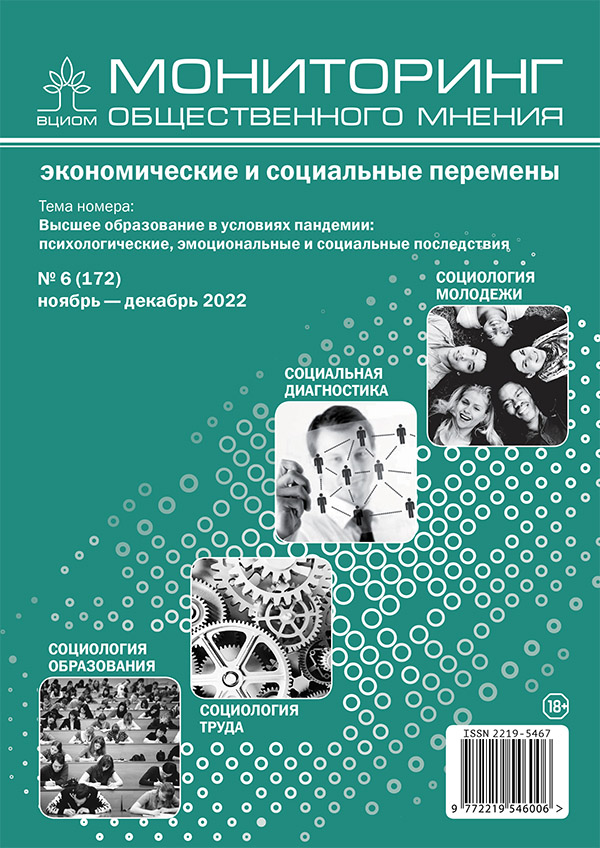Измерение когнитивной нагрузки респондентов, связанной с вынесением фактических и нормативных суждений
DOI:
https://doi.org/10.14515/monitoring.2022.6.2290Ключевые слова:
умственное усилие, когнитивная нагрузка, фактические суждения, нормативные суждения, факторный эксперимент с виньеткамиАннотация
Использование различных методов измерения когнитивной нагрузки и умственных усилий приобретает все большую популярность в различных областях социальной и аффективной нейронауки, в прикладных исследованиях сравнительной эффективности методов обучения и обучающих платформ, в исследованиях распределения внимания при решении различных задач или использования информационных подсказок при принятии решений и т. д. В этом более широком контексте специфический запрос на мультимодальную оценку когнитивной нагрузки интервьюеров и респондентов и оценку ее влияния на качество опросных данных, в том числе с использованием для этой цели параданных и веб-камер, в последнее время также растет. Мы провели внутрисубъектный методический эксперимент (N = 50), целью которого было сравнительное измерение вызванной заданием когнитивной нагрузки респондентов, связанной с двумя задачами на вынесение фактических и нормативных суждений. Первая задача подразумевала вынесение суждений о причинности, вине и тяжести вреда для двух институциональных областей (медицина, работа) с использованием аналогичных факторных виньеток, тогда как вторая задача предполагала вынесение обыденных фактических и нормативно-деонтических суждений о правах мигрантов на бесплатное медицинское обслуживание. Мы использовали параллельно две меры когнитивной нагрузки, связанной с заданием, — пупиллометрию (с использованием очков-айтрекера Pupil Lab) и шкалу оценки умственного усилия Ф. Пааса. Представленные в статье результаты предоставляют ограниченные доказательства в поддержку различия, которое существует между обыденными суждениями о причине, вине и тяжести вреда, с точки зрения их способности вызывать психосенсорную зрачковую реакцию и субъективно воспринимаемое умственное усилие, что отражает изменчивость когнитивной нагрузки респондента при выполнении соответствующего опросного задания. Мы также кратко обсуждаем доказательства, полученные в поддержку существования различий в чувствительности и достоверности нейрофизиологических и основанных на субъективных самоотчетах показателей когнитивной нагрузки респондента для специфических заданий.
Благодарность. Данное исследование осуществлено при финансовой поддержке Российского научного фонда (проект № 22-28-00968, тема «Окулография в мультимодальном измерении когнитивной нагрузки респондента»).
Заявление о конфликте интересов. Авторы не сообщили о потенциальном конфликте интересов.
Загрузки
Опубликован
Как цитировать
Выпуск
Раздел
Лицензия
Copyright (c) 2022 Мониторинг общественного мнения: экономические и социальные перемены

Это произведение доступно по лицензии Creative Commons «Attribution-NonCommercial-ShareAlike» («Атрибуция — Некоммерческое использование — На тех же условиях») 4.0 Всемирная.






